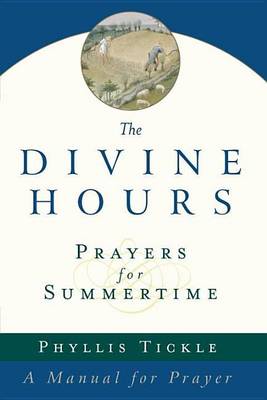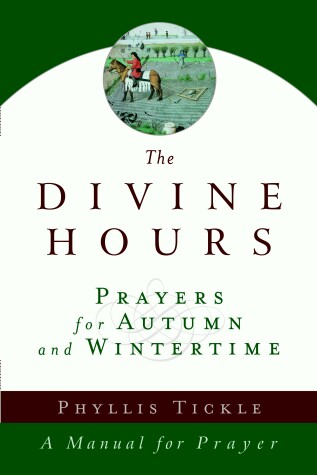Divine Hours
2 total works
The first volume in a trilogy of prayer manuals compiled by Publishers Weekly religion editor Phyllis Tickle as a contemporary Book of Hours to guide Christians gently yet authoritatively through the daily offices.
The Divine Hours is the first major literary and liturgical reworking of the sixth-century Benedictine...Read more
The Divine Hours is the first major literary and liturgical reworking of the sixth-century Benedictine...Read more
The first volume in a trilogy of prayer manuals compiled by Publishers Weekly religion editor Phyllis Tickle as a contemporary Book of Hours to guide Christians gently yet authoritatively through the daily offices.
The Divine Hours is the first major literary and liturgical reworking of the sixth-century Benedictine Rule of fixed-hour prayer. This beautifully conceived and thoroughly modern three-volume guide will appeal to the theological novice as well as to the ecclesiastical sophisticate. Making primary use of the Book of Common Prayer and the writings of the Church Fathers, The Divine Hours is also a companion to the New Jerusalem Bible, from which it draws its Scripture readings. The trilogy blends prayer and praise in a way that, while extraordinarily fresh, respects and builds upon the ancient wisdom of Christianity.
The first book in the set, Prayers for Summertime, filled with prayers, psalms, and readings, is one readers will turn to again and again. Compact in size, it is perfect for those seeking greater spiritual depth. As a contemporary Book of Hours, The Divine Hours: Prayers for Summertime heralds a renewal of the tradition of disciplined daily prayer, and will whet the hunger of a large and eager audience for the follow-up autumn/winter and spring volumes.
The Divine Hours is the first major literary and liturgical reworking of the sixth-century Benedictine Rule of fixed-hour prayer. This beautifully conceived and thoroughly modern three-volume guide will appeal to the theological novice as well as to the ecclesiastical sophisticate. Making primary use of the Book of Common Prayer and the writings of the Church Fathers, The Divine Hours is also a companion to the New Jerusalem Bible, from which it draws its Scripture readings. The trilogy blends prayer and praise in a way that, while extraordinarily fresh, respects and builds upon the ancient wisdom of Christianity.
The first book in the set, Prayers for Summertime, filled with prayers, psalms, and readings, is one readers will turn to again and again. Compact in size, it is perfect for those seeking greater spiritual depth. As a contemporary Book of Hours, The Divine Hours: Prayers for Summertime heralds a renewal of the tradition of disciplined daily prayer, and will whet the hunger of a large and eager audience for the follow-up autumn/winter and spring volumes.
The Divine Hours (Volume Two): Prayers for Autumn and Wintertime
by Phyllis Tickle
Published 19 September 2006
The second volume in a trilogy of prayer manuals compiled by Publishers Weekly religion editor Phyllis Tickle as a contemporary Book of Hours to guide Christians gently yet authoritatively through the daily offices.
The Divine Hours is the first major literary and liturgical reworking of the sixth-century Benedictine...Read more
The Divine Hours is the first major literary and liturgical reworking of the sixth-century Benedictine...Read more
The second volume in a trilogy of prayer manuals compiled by Publishers Weekly religion editor Phyllis Tickle as a contemporary Book of Hours to guide Christians gently yet authoritatively through the daily offices.
The Divine Hours is the first major literary and liturgical reworking of the sixth-century Benedictine Rule of fixed-hour prayer. This beautifully conceived and thoroughly modern three-volume guide will appeal to the theological novice as well as to the ecclesiastical sophisticate. Making primary use of the Book of Common Prayer and the writings of the Church Fathers, The Divine Hours is also a companion to the New Jerusalem Bible, from which it draws its Scripture readings. The trilogy blends prayer and praise in a way that, while extraordinarily fresh, respects and builds upon the ancient wisdom of Christianity.
The second book in the set, Prayers for Autumn and Wintertime, provides prayers, psalms, and readings for these two festive seasons. Compact, it is perfect for those seeking greater spiritual depth. As a contemporary Book of Hours, The Divine Hours: Prayers for Autumn and Wintertime heralds a renewal of the tradition of disciplined daily prayer, and gives those already using the first volume the continuity they are seeking. The series will culminate in a third volume for springtime, completing the liturgical and calendar year with the offices for every day.
The Divine Hours is the first major literary and liturgical reworking of the sixth-century Benedictine Rule of fixed-hour prayer. This beautifully conceived and thoroughly modern three-volume guide will appeal to the theological novice as well as to the ecclesiastical sophisticate. Making primary use of the Book of Common Prayer and the writings of the Church Fathers, The Divine Hours is also a companion to the New Jerusalem Bible, from which it draws its Scripture readings. The trilogy blends prayer and praise in a way that, while extraordinarily fresh, respects and builds upon the ancient wisdom of Christianity.
The second book in the set, Prayers for Autumn and Wintertime, provides prayers, psalms, and readings for these two festive seasons. Compact, it is perfect for those seeking greater spiritual depth. As a contemporary Book of Hours, The Divine Hours: Prayers for Autumn and Wintertime heralds a renewal of the tradition of disciplined daily prayer, and gives those already using the first volume the continuity they are seeking. The series will culminate in a third volume for springtime, completing the liturgical and calendar year with the offices for every day.


